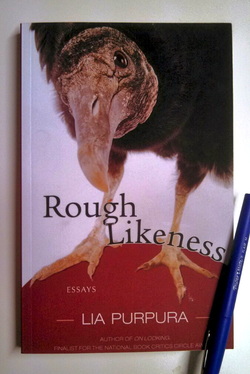 Dear Friend, I struggle to find the words to write to you about Lia Purpura’s essay collection, Rough Likeness. Probably, this is due to Purpura’s own finely tuned ear, which renders sentences with such clarity that any attempt by me to write of her writing seems only to add dissonance to her tune. And so, I suppose, let the pot-and-pan clamber begin. First, a summary of the collection: the collection defies summary. I swear to you, Friend, I am not being coy; I simply can’t boil Purpura’s work down into simple subjects. I am not alone. Even the back cover copy shies away from pinning down subjects, relying instead on a surplus of adjectives and verbs rather than the usual nouns. I can’t help but think these parts of speech clue us into what her essays are really “about”: not people, places, or things so much, but the experience of thinking deeply about all of them. Yes, Purpura is a thinker, and thus, her essays require thought. At times, I admit, I feel as if she’s trying to buck me through the tangential. She herself acknowledges her long-range leaps (“stay with me here”), though it's the challenge of staying with her that makes the reading experience a joy. When I read Purpura’s work, I find myself reading not only for the essay’s subject, but for the essay’s experiment as well. They are like two trapeze artists who always meet mid-air—tangling with such elegance that it’s all but impossible for me to see where one ends and the other begins. While I could say far more about her swoops in structure and subject, I can’t keep myself from writing love letters to the language itself. The way she handles words like baby birds—every last one cradled and stroked before inserted into its perfect place. But it’s not easy--not even for her. In “Augury,” Purpura dedicates several pages to unwinding the image of a bird snagged in a tangle of fishing line. Her unwinding takes time, and as she revises her language again and again, she leaves everything on the page so that we readers might know her struggle. “Then into the bower rained a bird,” she writes. “Dropped a bird. Now swings a bird. Hangs a bird.” The bird, now dead, no longer moves, though Purpura’s attempt to describe it keeps the image in motion. By reevaluating her language, she breathes life into a dead thing, helping us see the bird not for what it was, but for what it still is to her. I'm clambering again, and in an attempt to find focus, perhaps I’ll linger on “There Are Things Awry Here,” an essay in which Purpura tries to understand her visit to Tuscaloosa, Alabama—a visit I remember well. I was a grad student then, and though I (dumbly) didn’t enroll in her class, I served as a loyal loiterer during the week she spent in our town. As a result, I know the people she writes about in her essay. And I know the place. But I also know her confusion with the place, a land, as she notes, “Where stories won’t take…” Simply put, Tuscaloosa--like Purpura's collection--defies simple summary. And Purpura’s right in drawing attention to the complexities of the landscape. Yet rather than becoming stonewalled by the setting, she simply tried another tact. “When the land would not speak and my characters failed, when the land was muffled and my characters stock, this piece was born,” she writes. When I read the aforementioned lines, my mind immediately goes to a Charles D’Ambrosio quotation: “The problem with an essay can eventually become its subject.” Yes, Friend. This is it exactly. Every time I try to write an essay that matters to me, the essay puts up its fists. This battle wages on for some time. After awhile, I begin imagining us as two weary boxers bumbling about in the ring--starry-eyed, unhinged, and desperate to hold our ground. But after enough rounds, sometimes I surprise the essay by surprising myself and doing what Purpura did—ditching the battle plan and going off script, allowing the essay to lead. Pacifist that I am, I'm sure it doesn't surprise you to learn that I prefer my essays as dance partners rather than boxing opponents. But in truth, I'm not sure either metaphor aptly describes the relationship between essay and writer. After all, to an essay, the writer is neither a partner or an opponent--just the person on the other end of the high wire, reaching out in the hopes that someone might reach back. Okay, enough with my clambering. Take care Friend, and write soon. Until then,
3 Comments
J. Pfeiffer
5/12/2014 04:15:10 am
BJ,
Reply
Leave a Reply. |
AuthorB.J. Hollars is a writer and a teacher. Archives
June 2014
Categories |
 RSS Feed
RSS Feed